- Home
- Jim Fergus
Strongheart: The Lost Journals of May Dodd and Molly McGill Page 17
Strongheart: The Lost Journals of May Dodd and Molly McGill Read online
Page 17
“I wanted to take that little dog home, but I knew my family wouldn’t let me have her in the house, so I started bringing food to her whenever I could. And a little later, when I ran away from home again, I took her with me. I got all the way to Billings that time, and I went to the animal rescue shelter there. They gave her free shots, and the vet on duty told me she was only about a year old. Only one year old and she scared off those three big adult male dogs …
“That little dog taught me a lesson about the source of power, about acting tough and unfearful in the face of danger, even if you’re not feeling tough and are terrified. She taught me a lesson about defending my territory, because no one else is going to do that for me. I learned not to let myself be a victim, even though I already was one, and would continue to be at the hands of a family member, who was bigger and stronger than me, and on whom my bluff and toughness were not adequate defense. And later, I just became a victim of my own weakness … but it was thinking about that dog that helped bring me out of my victimhood.
“Anyway, I knew it was only a matter of time before I was caught again and sent back to the res, so I left the bitch at the shelter, and one of the ladies who worked there promised me she was going to adopt her. I loved that little dog, and it has always given me great solace to imagine her spending her life in a nice home with a yard to run in, and maybe some kids to play with … I think I wanted that lady to adopt me, too … so I could run around in the yard with that little dog.”
I started crying a little then, surprising myself with my own emotion. JW held me close against him so I could cry into his neck, and he whispered: “That’s a good story, Molly.” He didn’t ask me any more questions or say anything more than that, which I appreciated, because there was nothing more to be said. It’s funny the things we carry around all our lives, both the good and the bad, both the things that make us happy and those that make us sad.
THE LOST JOURNALS OF MAY DODD
A Life of Crime
I did something strange then, and as much as I’ve thought about it since, I’m still not exactly certain why. I held both lead ropes in one hand, and the other hand I placed affectionately on the boy’s cheek, and I kissed him directly on his lips, a real kiss like a lover. And he kissed me back. “Thank you,” I whispered, in his mouth, “thank you so much.” And then I led the two horses away, turning only once to see him staring after me with a look of utter astonishment on his face, as I disappeared into the darkness beyond.
—from the lost journals of May Dodd
12 June 1876
We sold the additional four horses to the stablemaster, P. J. Bartlett, in the foothills of the Bighorns, eleven miles from Fort Fetterman. Considering that Wind and I had stolen the mounts from the outlaw gang who captured us, we made rather a handsome profit for our efforts. Having lived in a barter society of hunters, gatherers, and hide traders, it is still a strange feeling to return to a cash economy, and to have all this money in our possession, not to mention for me to be dressed as a white frontierswoman, in which role I continue to feel like an impostor. I live with one foot in both worlds.
As well as our two favorite horses, Wind and I kept two more of the string as pack/riding animals to carry our new supplies, and to alternate with the others. I also purchased a calendar and several more ledger books at the mercantile, though I have written virtually nothing these past days.
For our second transaction, Mr. Bartlett and his two sons met us at a designated spot outside Tent City, so that we did not have to bring the horses into town and either risk another encounter with Captain John G. Bourke or expose Wind to the indignities and possible dangers facing an Indian woman in a town of whites. In any case, as I mentioned earlier, she had steadfastly refused to enter any village or homestead … and who can blame her?
The Bartletts went through their routine of riding and inspecting our equines for handling and soundness and, after a bit of negotiation, a price suitable to both parties was amicably reached. I could see that they respected me in our dealings, while largely ignoring Wind, and I considered how different … indeed, how impossible such a transaction would have been had I arrived dressed as a squaw. This is yet another rationale used by my race to exterminate or incarcerate the native population, simply because they are different than we are; they have darker skin, and Mongolian features, both strikingly handsome and foreign; they live in tipis instead of houses; they are nomads instead of permanent dwellers; they believe that human beings are simply a part of the natural world, and not lords over it. Yet they are also, it must be said, a culture of warriors, and this, perhaps, is what we have most in common … except that we whites are more numerous and have better weapons than they. It is, finally, the history of civilization against wilderness, a battle that wilderness doesn’t stand a fair chance of winning.
“Mrs. Ames,” said P. J. Bartlett upon conclusion of our business, “when and if you and your husband should acquire more stock for sale, I am always in need of sound horseflesh, and you seem to have a fine eye for it. Do keep us in mind. I think you can see that we run an honest business and are fair in our dealings.”
“I can, indeed, sir, and I will keep that in mind. I should also like to give credit where credit is due, to our partner, who goes by the name of Wind,” I said, indicating my friend, who all this time sat her mount, watching the proceedings with a wary eye. “It is she who has trained all of our string, and is also known in her tribe as one of their most accomplished horse breakers. If you have no objection to the native … or perhaps I should more accurately say, the wild descendants of Spanish equines, we might also be able to bring you some of these to inspect. They are hardy and well suited to this plains country, and once broken and trained, they are every bit equal and, in our opinion, superior to the average Army horse, having spent generations living in this landscape.”
To his credit, P. J., looked over at Wind and touched the brim of his hat in a gesture of polite acknowledgment. “I would be happy to look over whatever you bring me, ma’am,” he said. “Speaking of the Army, I must tell you that a certain Captain John Bourke came to see me the day after our first transaction.” Bartlett looked at me inquiringly before proceeding, as if to ascertain if the name alone might elicit some expression of recognition on my part. “He asked many questions about you, Mrs. Ames.”
Although my heart registered a quickening, I do not believe that my face gave it away. “Did he? I’m afraid I don’t understand, Mr. Bartlett. What sort of questions, and for what purpose was the captain asking them?”
“Apparently, he saw you briefly in the mercantile that day, and he seemed to think he might know you. The questions he asked were to determine whether or not this was the case.”
“I do not know a Captain Bourke, sir, nor does the name itself mean anything to me.”
“In his questioning of me, Mrs. Ames, I mentioned that you had not wished to return to the mercantile to pick up your goods … although I did not know for what reason. I also told him your name, and that you and your husband were from Nebraska, and in the horse business. I hope I did not in any way violate your privacy, ma’am, but I do a good deal of business with the Army, and I must be forthcoming when interviewed by an officer. My reputation is at stake.”
“Of course, Mr. Bartlett. And I can assure you that nothing you said to the captain could possibly compromise my privacy. Clearly, he must have mistaken me for someone he once knew. No harm is done.”
“I must also tell you, ma’am,” he continued, “that depending on your and your husband’s plans, travel in the country north of here is likely to be treacherous due to a reported massing of hostile Indians over the border in Montana Territory. These are largely Sioux, Cheyenne, and Arapaho bands who refuse to go into the agencies as demanded by the government and are fixing for a fight. General Crook has left Fort Fetterman with a massive force of soldiers to intercept and defeat, once and for all, the last of these miscreants.”
“I see … I t
hank you for that warning, sir. It appears that my husband will not be in any condition to travel for some time. However, our partner, Wind, and I, must continue to ply our trade. It seems as if such a gathering might provide business opportunities, for surely the commodity of horses will be much in demand. Of which side do you feel an Indian woman and a white woman traveling alone together have the most to fear, the natives or the soldiers?”
“Both, Mrs. Ames, and especially of the confrontation between them. I am surprised, if I may be so bold to say, that your husband would let you go off alone. Believe me, you do not want to get in the middle of those two armies, of that I can assure you.” Little did Mr. Bartlett know how much in the middle of them we had already been.
“I highly recommend that you consider settling right here in our region,” he continued. “It is a growing community with a great future, and a safe haven from the heathens due to the presence of the fort. Furthermore, as I suggested, P. J. Bartlett and Sons will purchase all the horses you bring us. You need not risk your lives by going afield to ply your trade.”
“Well, sir, you have generously depleted us of our stock, so we must go a bit afield in any case.”
“Confine your search to the east, west, or south, then, ma’am, I highly recommend.”
And so we parted company. I told Wind that we must leave immediately and not return here.
“And where do we go, Mesoke?” she asked me.
It was a good question, and there were two quite different answers I had been pondering. We could continue our wanderings, or we could go back toward the Red Cloud Agency at Fort Robinson and possibly be reunited with Little Wolf’s band, assuming they are still there … I could rejoin my daughter … my Little Bird, for it is her, if no one else, whom I must save from this place. It has taken me nearly all this time to feel truly alive again, as if my near death—all that precipitated it, and came after—killed some essential part of me, overwhelming even my maternal instincts, only now reawakening. I have lost three children, not to death, thank God for that, but lost only to me … and I long to recover at least one of them … my baby. But then once again, at the agency I would be reported to the Army and the government, and certainly sent back to Chicago, to resume my incarceration in the Lake Forest Lunatic Asylum. And I would lose my child again. Better to push on.
“We go north,” I said, “where the tribes and the Army are gathering. The People will always need more horses, and on the way, we will find some for them.”
23 June 1876
And thus have we been traveling, keeping largely to the foothills of the Bighorn Mountains, as we know that the Army, with its ungainly mule-drawn supply wagons, will follow the more easily traveled routes in the plains to the east. For the most obvious reasons, we wish to avoid contact with them … unless we decide to risk a raid on what must be their own enormous herd of horses.
This is lovely, rich country we are moving through in the early summer. The Bighorns are fragrantly green with forests of lodgepole pine trees, and stands of aspen in fresh new leaf, wild rosebushes, and mountain meadows with an impossible fecundity and variety of flowers in bloom, so beautiful that one does not wish to disturb the flora by riding a horse through them. Of wildlife, there is an equal bounty: mule deer and whitetail deer, elk, moose, antelope, bighorn sheep, hawks, eagles, falcons, owls of all sorts, grouse and wild turkey, bears, coyotes, and mountain lions.
There are creeks, and feeder streams, that enter into the larger rivers in the flatlands at the base of the mountains; the water still high and muddy with spring runoff, but clearing now in the foothills. We have no trouble catching trout in the smaller, more intimate creeks. Indeed, one of my purchases at the mercantile in Tent City was a bamboo fishing rod and a reel with braided horsehair line. According to the proprietor, these items are kept in stock because fishing has become a popular pastime among the soldiers at Fort Fetterman, and General George Crook himself is a particular aficionado of the sport … that is, during their leisure time when he and his soldiers are not busy hunting down and killing hostile Indians.
Yet it is easy this time of year, in this landscape, to imagine a false sense of security, as if the wars are very far away. Thus we dawdle somewhat in our travels, reveling in the mountain paradise, ignoring for these precious moments the true task at hand, to rejoin the fight.
Wind seems for once uncertain of herself, for she receives no messages from her twin sister, nor has she had a vision in which she has received news of where she and Little Wolf’s band are.
1 July 1876
Three days ago, we ventured back down into lower country in search of horses, wild or otherwise. As if by providence, before we had descended completely from the foothills, we saw in the plains some distance to the east a great cloud of dust rising, stirred up, we soon learned, by a cattle drive moving north, on its way, we assumed, to Montana Territory, where, according to Mr. Bartlett, ranchers are staking out vast tracts of grazing land now that both the buffalo herds and the tribes have been so decimated. It brought to my mind a similar scene we had witnessed from our train when first our group was headed out west. Those scamps Meggie and Susie had put their bare fannies up to the train windows, which shocked a number of our women, but amused others of us, and clearly charmed the cowboys who were driving the herd. They took their hats off, whooping and waving them in the air to greet those naked Irish butts. How long ago that now seems … how innocent we all still were …
As Wind and I moved closer to the drive, we guessed that there must be at least two to three hundred head of longhorn cattle, although their numbers were impossible to accurately estimate, partly due to the dust cloud that obscured them. Several wranglers were also driving a remuda of extra horses. In order to get a sense of their daily routine, we followed them for two days, at a sufficient distance not to be discovered. At night, we made forays on foot closer to their evening fires to see how and where the horses were corralled. I was dressed again in my deer hide shift, leggings, and moccasins, and the two of us moved as silently as only Indians can, like ghosts. Wind said the horses would know that we were about, and it was good, for they would catch our scent and we would thus be familiar to them when we went in to steal them. Some of the mounts the cowboys rode were picketed together, while other hands kept theirs tethered next to their individual sleeping places. The remuda was held in a roughly circular picket line. This would be our primary target and as there were only two of us, we knew we could not be greedy and attempt to take too many. Wind said that unlike those we stole from the outlaws, these horses did not know us yet, only our vague scent, and when we first appeared among them they would likely be a little spooked.
“In the old days, when I was just a girl,” she said, “and my talent with horses had become known to the tribe, I would go on raiding parties with our men. All knew that I brought good luck. The important warriors of our enemies kept their favorite warhorse, or two, tied beside their lodge, as do we. These are always the best and most prized horses to take, but also the hardest and most dangerous to steal, for the slightest noise will wake someone in the tipi. This task was usually given to me, for, as you know, Mesoke, I gentle them, I speak to them without words, they recognize me as a friend. It has always been this way with me and horses. You are a white woman, and these cowboy horses know how white people smell. I saw how the outlaw horses accepted you and so I believe will these. For our first raid, we will each take two, one to ride and one to lead. But we will go among them the night before we steal them, to make them familiar with us, to touch them, and to choose those we wish to take.”
And this we did, coming into the night camp of the cowboys very late, while all slept. There was only a thin sliver of moon in the sky, but our night vision was keen from the fact that we spent so much time in the dark. We already knew where the single wrangler who watched the remuda at night would station himself, for every night on the trail their bivouac was set up the same. At this hour he always slept, and when he woke
, he walked around the circle of the picket line and then slept again, using his saddle as a pillow.
It wasn’t such an easy life these white men led. But during the several nights we had been following and watching them, we heard them singing after their supper. One of the men played a guitar, and another a harmonica, and the cowboy songs they sang were lively with a jaunty tempo, while others were sad, both the instruments and the words telling tales of failed love. I rather liked their music, though Wind did not, which made me recognize again that a part of me … the white part … missed my people.
That first night we each picked out the two horses we were going to take, and we introduced ourselves to them. I picked a small sorrel mare to ride, and a bay gelding who was tied near her and who I thought had a particularly well-formed head. Wind told me I had a good eye for horseflesh. I touched mine gently along their flanks and caressed their heads. She picked a palomino and a buckskin, both of them geldings.
We followed the drive again all the next day, and that night after the music died, we lay awake outside their camp. Having watched them for three days, I had begun to feel some attachment to these cowboys, and a certain sense of guilt about the prospect of stealing their horses. They were just young men, some of them mere boys, trying to make a living at what must be a very hard job, day after day in the saddle, weeks and months on the trail, breathing dust kicked up by a herd of bawling cattle. But I tried to put these sympathetic thoughts out of my mind for we, too, had a job to do, and we, too, had faced more than our share of hardship.

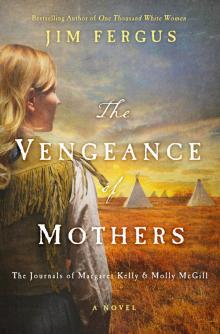 La Vengeance des mères
La Vengeance des mères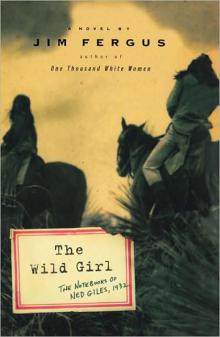 The Wild Girl: The Notebooks of Ned Giles, 1932
The Wild Girl: The Notebooks of Ned Giles, 1932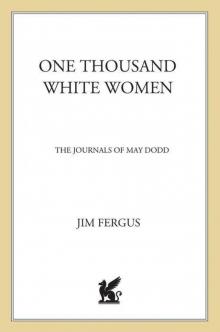 One Thousand White Women
One Thousand White Women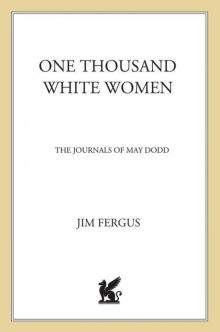 One Thousand White Women: The Journals of May Dodd
One Thousand White Women: The Journals of May Dodd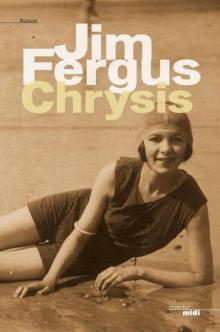 Chrysis
Chrysis Strongheart: The Lost Journals of May Dodd and Molly McGill
Strongheart: The Lost Journals of May Dodd and Molly McGill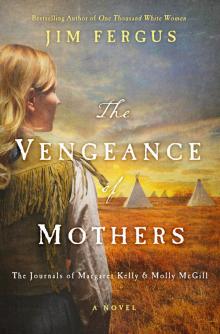 The Vengeance of Mothers
The Vengeance of Mothers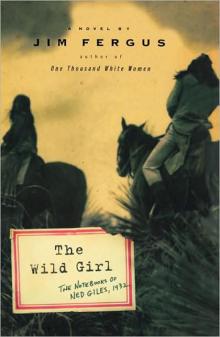 The Wild Girl
The Wild Girl